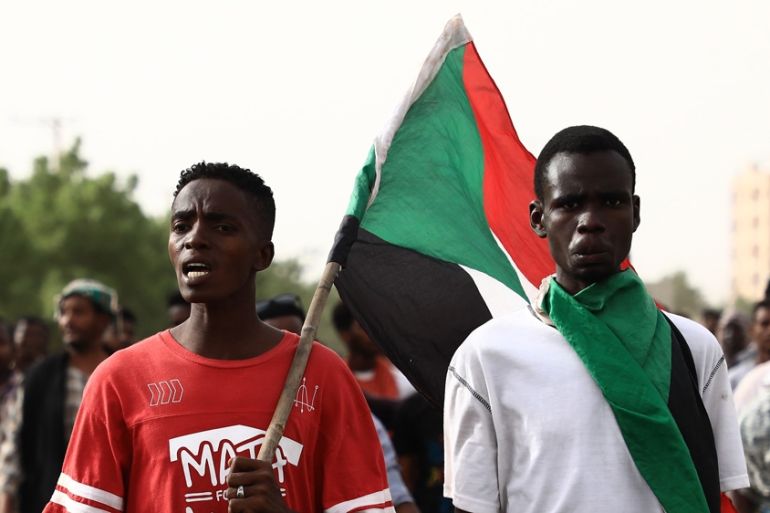Amid stalemate, Sudanese struggle to cope with economic crisis
Financial woes that played major role in protests that led to al-Bashir’s toppling continue during political deadlock.

From Sunday to Thursday each week, Hamid Mohamed leaves his home in Alhaja Yousef in northeastern Khartoum to go to the centre of the Sudanese capital to start his eight-hour shift as a hotel cook. And on Friday and Saturday, the weekend, he returns to the same establishment – this time to work as a gardener.
“I’m taking care of my own family, parents, and siblings,” says Mohamed, who is in his early 40s. “My father cannot work because he has a problem in his leg … and I have to work now every day – even though the hotel raised our salaries, that’s not enough.”
He is just one of the many struggling Sudanese who have been hit by an acute economic crisis that played a major role in triggering the months-long demonstrations that led to the military removal of the country’s long-time President Omar al-Bashir in April.
Mohamed says he doesn’t feel the financial situation has improved since al-Bashir’s overthrow. Instead, he says, “it’s getting worse, and life is more difficult now.”
Long queues – from cash machines through petrol stations to bakeries – have continued to be a common sight across Khartoum, just as it was before al-Bashir’s overthrow when the value of the Sudanese pound had plummeted and inflation skyrocketed.
This is despite a cash injection granted by Saudi Arabia and the United Arab Emirates to the ruling Transitional Military Council (TMC) that seized power from al-Bashir on April 11.
More than 100 people killed
Atif Alsamani, a 29-year-old owner of a car repair shop, said he has had to sack four of his employees in recent weeks due to his inability to pay their salaries. Pointing to his semi-empty store, he said he was in “deficit” because of “the changes in the value of the Sudanese pound”.
“In the last Eid, for example, I couldn’t buy anything for myself except of a deodorant,” he said, referring to the religious festival that in June marked the Muslim holy month of Ramadan. “Normally, I buy new clothes, but I couldn’t do it this time.”
Against the background of the ongoing economic problems, the TMC and the opposition leaders seeking a transition to civilian rule have failed to finalise the details of a power-sharing deal that was signed last week in a bid to resolve the political deadlock.
The African Union-mediated deal, whose signing was delayed for a third time on Thursday evening, came after two days of talks following the collapse of earlier negotiations in the wake of a deadly crackdown at a protest camp outside the military headquarters.
Protest organisers said more than a 100 people were killed in the bloody dispersal of the sit-in on June 3, with 40 bodies were dumped into the river Nile. Hundreds more were wounded and dozens were raped, according to the opposition. The TMC admitted there had been 61 deaths.
The disagreement over the deal revolves around the responsibilities of the council of ministers which will be formed by the Forces for Freedom and Change (FFC), an umbrella alliance of opposition groups.
The TMC wants the joint civilian-military sovereign council that will be formed to endorse all their decisions, and they also want to have a say on the ministers’ appointment by the FCC, according to Professor Mohamed Yousef al-Mustafa, who is an FFC leader.
He blamed the “mysterious” delay on the generals.
“The TMC is under enormous pressure from two sides; the counter-revolution forces in Sudan, among them the Islamists, and the regional axis of Saudi Arabia, UAE and Egypt who all have their own interests in Sudan,” he says.
“The counterrevolution forces want to keep the previous regime so that they can continue their corrupt interests; also the regional axis wants to keep the Sudanese forces at the war in Yemen and as well as they have geo-political interest in Sudan,” he adds.
Lack of trust
According to a Western diplomat who is based in Khartoum and is close to the negotiations, the lack of trust between the two sides might complicate things further.
“They need to trust each other first and talk about the priorities of the interim period,” he said, speaking on condition of anonymity.
Amid the stalemate, the inflation rate rose to 47.78 percent in June compared with 44 percent in the previous month, according to official figures released on Thursday.
Protest leaders last month called for a mass demonstration on July 13 but after the signing of the deal changed their stance and urged people to take to the streets in celebration. But now, the stalling of the negotiations has led activists and neighbourhood committees – the backbone of the uprising – to call for anti-TMC protests again..
Activist Mohanad Eldiridi criticised the deal, which he argued was not representative of the Sudanese people.
“These people who are negotiating came up with an agreement that contradicts with the declaration of the FFC by agreeing on giving the army the longer term of ruling,” he said.
“In Sudan, in order to be able to reach a leading position at any political party, you have to be from a certain class and to [be] offered it. The majority of the people can’t do that after graduating from universities; they need to work to make living so they can’t become politicians.”